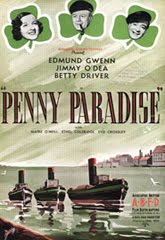Penny Paradise
| Penny Paradise | |
|---|---|
 1938 Ealing campaign book cover | |
| Directed by | Carol Reed |
| Written by | Thomas Browne Walter Meade Thomas Thompson Basil Dean |
| Produced by | Basil Dean |
| Starring | Edmund Gwenn Betty Driver Jimmy O'Dea |
| Cinematography | Ronald Neame Gordon Dines |
| Edited by | Ernest Aldridge |
| Music by | Harry O'Donovan |
Production company | |
| Distributed by | Associated British |
Release date | 24 September 1938 |
Running time | 72 minutes |
| Country | United Kingdom |
| Language | English |
Penny Paradise is a 1938 British comedy film directed by Carol Reed and starring Edmund Gwenn, Betty Driver and Jimmy O'Dea. It was made at Ealing Studios. It was an early directorial assignment for Reed, and along with many other British productions of the era such as the same year's better-known Reed-directed Bank Holiday, is described as: "...belonging to a wider studio tradition of modest representation of ordinary British life."[1]
Plot
The film is set in Liverpool, where tugboat captain Joe Higgins (Edmund Gwenn), believing he has won a fortune on the football pools, resigns from his job and throws a party in a local public house where family and friends – some of whom have an eye on a share of the winnings – gather to celebrate his good luck. Higgins pays court to the widow Clegg (Maire O'Neill) who he has been wooing, while his daughter Betty (Betty Driver) is targeted by a chancer who sniffs money. The party grinds to a halt with the arrival of the hapless Pat (Jimmy O'Dea), Higgins' Irish first mate on the tugboat, who is forced to admit that he forgot to post the winning pools coupon. There now seems no reason for celebration, but Higgins is mollified when his former employer offers him the captaincy of the best tugboat on the River Mersey, a position to which he had long aspired.
The action of the film is interspersed with several musical numbers performed by Driver and one by O'Dea. While O'Dea's song is clearly provided for comic effect, those sung by Driver are presented straight.
Cast
- Edmund Gwenn as Joe Higgins
- Betty Driver as Betty Higgins
- Jimmy O'Dea as Pat
- Ethel Coleridge as Aunt Agnes
- Maire O'Neill as Widow Clegg
- Syd Crossley as Uncle Lancelot
- James Harcourt as Amos Cook
- Jack Livesey as Bert
- Frederick Burtwell as Policeman
References
- ^ Basil Dean BFI Screen Online. Retrieved 31-07-2010
External links
- Penny Paradise at IMDb
- Penny Paradise at AllMovie
- Penny Paradise at BritMovie (archived)
